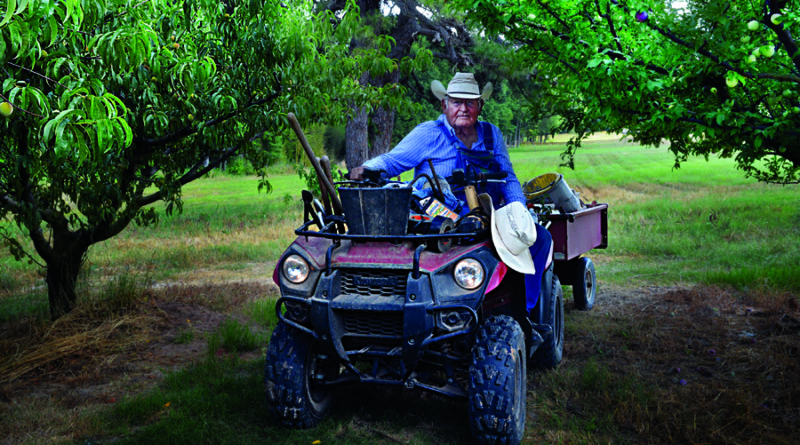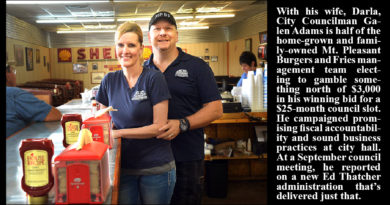A word of instruction turned his fields to a campus where school boys learned the ways of a man

By HUDSON OLD
Journal Publisher
PITTSBURG – A spirited domino opponent, Mrs. John E. (Betty) Smith is a gracious winner. It’s getting beat that changes her mood.
A vixen, she’s nine years younger than his 90 years. She was 16 when they married. Her eyes crackle china blue.
Once when she was in the hospital, the room was too small. Dozing in a bedside chair through the night, he woke up every time his chin hit the chest of his bib overalls.
“Go home, John,” she commanded. Wishing at once she had the words back, she cried when he left, big tears shimmering reflections of china blue. Otherwise, they’ve never spent an evening apart.
He’s remarkable because he’s not. After he sleeps, he gets up and works. He keeps flowers in her yard. A broad shouldered slab of a man, he moves easy, ambling smoothly along on two canes. His garden rows are wide enough to accommodate the four wheeler he mounts side-saddle when he hoes.

He’s picked his trees clean of early plums. His berries are done and his row of peach trees is loaded. With a roof overhead and a good wife, what else on earth could a man need to be at ease?
“A good garden makes us happy,” he said. Produce draws shoals of neighbors, children, grandchildren and a bumper crop of 20 grandchildren.
His family was still renting when Mr. Smith wiggled into the world in 1928, two houses up the old Gilmer highway. From that day to this, there has always been work to do so that other than his military hitch, he considers traveling a disruption.
“We like home,” she said.
It was summer, about 40 years ago, when Lisa and Linda were teenagers. One day they drove to Memphis to see Graceland. They spent the night in a motel, talking about Elvis and the next day they left driving south, taking a different route back to Pittsburg.
“I think we came to an east-west crossroad somewhere in Mississippi,” Mrs. Smith said, and maybe she’d mentioned something about her brother out in Georgia, over in Atlanta. They stopped at the crossroads where west went home and east to Atlanta.
“Which way?” he said, and he meant it so they turned left and went to Georgia.
He was 17 months old in October, 1929 when the stock market crash triggered the years of the Great Depression. Money evaporated, a strange time that also wasn’t strange because it was the same for every family he came of age knowing.
After paying what they’d borrowed for seed in the spring, they paid their bank note when they sold their cotton in the fall. Whatever cash was left was most of what they had for the year.
They had three mules, six Jersey cows and no need for gasoline. They grew the corn that fueled the mules that taught him to plow and he learned to cut and bundle and tie shocks of sorghum they fed through the winter.
“The best way to harvest a field of sorghum was with a sharp butcher knife,” he said.
He was 13 in 1941 when World War II launched the war-time economy pulling the country out of the long years of the Depression. By 1946 the family bought their own place.
“He and his daddy built their house,” Mrs. Smith said. “They were good people, which is the only reason I got to go with him.”
Home from his 1950’s time in the military, he moved along with thousands of farmers who’d gone to work for union scale wages at Lone Star Steel. He bought a Harley. The first day she saw him she had to look up to study his face.
“I knew right then,” she said, remembering the exact moment that it happened, as unexpected as it was natural. He bought land, a few acres and the house where they live. Later, they bought more land.
When the steel workers struck in 1957 he was a company man. The strike was a violent thing, a disruption of work. The day their girls wondered why he wasn’t leaving for work, John and Betty Smith made a joke about it. Everybody knowing the story doesn’t need to hear it again to laugh at the punch line.
“We told the girls their daddy’s job burned up,” Mrs. Smith said.

He’d built a shed for their car and that winter he took it down and moved it out on the front yard, next to the highway. In spring they planted watermelons, corn, squash and then acres of peas and they sold everything out of the shed by the road. There were more than a dozen peach orchards in Camp County then and he bought peaches and sold those too.
The next year he leased an orchard, the same year he began planting his own. He began hiring school boys. She graded peaches, worked the shed and kept books and over the next 20 years she wrote down the names of something more than 200 boys they worked and nurtured, an annual crop of emerging men.
“They all thought he could read their minds,” Mrs. Smith laughed and remembered. “He understood boys and knew what it took to work them because boys are boys no different than he’d been at their age.”
So they learned that there was no foolishness about work, that changing from a boy to a man meant not worrying about the size of the field but only moving down the row, making progress.
“If you stop hoeing to think about how long it’s going to take to work ten acres of peas, you’ll never finish,” said Jacob Butler. Still in his 30’s, he’s just been made president of a bank.
There were two ways to do the work Mr. Smith gave the school boys: the wrong way and the way he taught them. He’s a quiet man because when everything’s going right there’s nothing that needs saying. Where he is, things tend to go right. There was never any trouble at the peach shed but there was a day there could have been.

patriarch. At left is State Rep grandson Cole Hefner. At right is his mother Lisa, John and Betty Smith’s first daughter.
They were quiet, working in back. Two men lacking respect for Mrs. Smith interrupted. When Mr. Smith went up to say the moment was right for them to leave, they at once understood his wisdom.
“Without having to tell anybody, the same way we watched him do it, you wanted to be as tough as he is,” Mr. Butler said, “and when you earned his approval you’d start thinking maybe you were. One day three of us arm wrestled him at once. We locked on and started pulling and his arm never budged. He sat there until we were spent, then just pulled us down.”
Each boy got a number and when they picked peaches he signed his number to his boxes.
“When they were grading peaches at the shed he knew who’d picked what,” Mr. Butler said. “We paid attention.”
Easy to track down at the bank, Mr. Butler was one of those invited to a surprise party at the church to celebrate the approach of Mr. Smith’s 90th birthday. Word of it circled Pittsburg for nearly two months and to the town’s credit not a word leaked back.

The fellowship hall was packed. There was a reception line. Weeks in the making, a 20-minute slide show set to music brought photo albums to moving life, put lumps in throats and made people laugh at the same time.
Not a man accustomed to being asked to address a crowd, Alan Humphrey drove 300 miles to be there and say a word.
He said he hated hoeing, and he took a breath and looked where Mr. Smith sat. And as if speaking only to him, Mr. Humphrey said, “I thank God every day for the first job I ever had.”
Then he paused and looked back at everybody else and relieved to be done he said, “Don’t ask me to do this again,” and sat down. Then he drove 300 miles back home.
Kerry John Efurd said, “I wanted to work so he’d be proud of me.” He said he liked bringing peaches to the shed because Mrs. Smith sang while she graded peaches coming up the conveyor line, that she sang beautifully and knew hymns by heart.
Mike Cavender slipped into town, seconded the opinion that Mr. Smith was the strongest man in the country. He likewise said any high school boy fool enough to challenge either of the Smith girls to an arm wrestling match did so at the risk of humiliation.
Now a Department of Public Safety Trooper, Mark McKinney remembered the day he worked up the courage to ask if he could fish in Mr. Smith’s pond.
“McKinney,” Mr. Smith said, “that’s a secret fishing hole I keep for my mother, but I’m gonna let you go one time.”
When he asked a second time, Mr. Smith said, “McKinney, that’s a secret fishing hole I keep for my mother, but I’m gonna let you go one time.”
Particularly when you’re young, all day in the summer blaze of a peach orchard seems like it might never end, but quitting wasn’t an option, John McCellon said.
“Right now I’d rather go pick sand burs than go back and pick peaches,” he said. He said what he learned was that “you don’t just work at something, you work to get better.”
A month before the gathering at the church, grandson and State Representative Cole Hefner dropped by the Journal office and asked me to come to the party. He’s Lisa’s son. He said they were inviting as many of the school boys as they could find.
I told him my story about his cousin, Linda’s daughter, Jessica. It was the summer of ’95 according to the file date on the negatives I shot that day. A mother and daughter team, Mrs. Smith and Linda were working the counter and I was sitting in the back getting to know Mr. Smith when Jessica came in to help at the counter. She was 15 and stunning.
“Granddaughter?” I wondered. Mr. Smith smiled, catching my meaning.
“You oughta see her mama,” Mr. Smith said, then called, “Linda,” so that his daughter turned.
“Sir?” she said, flashing her mama’s eyes.
Mission accomplished.
“That’s all,” Mr. Smith said.
Tipped off by the state rep and thinking to get a jump on the story, I called Mr. Smith and said I’d like to visit with him for a story about peaches. He said he couldn’t hear well over the phone, that it would be better if I called back and talked to his wife.
“He’s not a big talker,” Mrs. Smith said.
That worked, because after hearing the men at the party who’d been the Smith family school boys, I knew better what to ask when he agreed to let me invite myself out to visit his garden.
He was sitting side-saddle on his four wheeler. Working with leisurely purpose, he hoed his tomato row. I told him I’d heard he used to ride a Harley. I asked if he’d ever been foolish – ever.
He grinned and let me in, remembering a motorcycle with a throttle he could lock and stand up on the seat, balancing at crazy speed, flying like a plane racing over the road.
“Those old motorcycles were front end heavy,” he said. “If you felt that front fork shimmy you needed to back out right then or it’d go into what we called a power wobble. Once it started, you couldn’t pull it out.”
One day it occurred to him that the temptation to fly came with a risk that made no sense. So he sold his motorcycle and never missed it.
He said he’d spotted a worm he didn’t want while we were coming up the tomato row, that he needed to go mix a spray.
He is intolerant of worms.
She said evenings when they go to bed and don’t drift away into an easy night’s sleep, they get up and play dominoes. Knowing she’s a gracious winner, I wondered if that figures into the way he plays his hand.
Just because they’re pretty doesn’t mean a change in the mood of china blue eyes can’t cut a strong man to the core.






Nice i really enjoyed reading your blogs. Keep on posting. Thanks